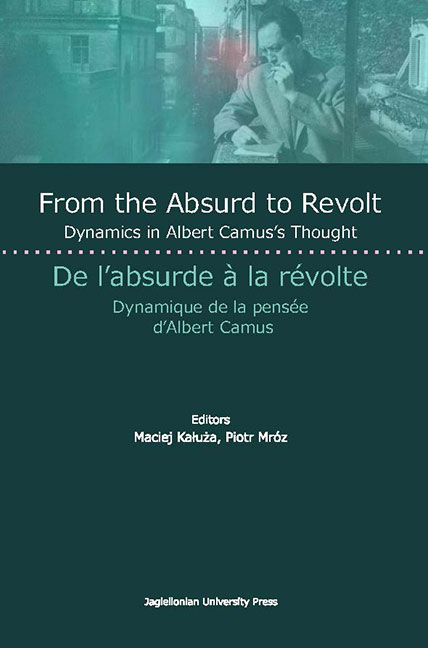Book contents
- Frontmatter
- Contents
- Introduction
- Part One From the Absurd to Revolt, Analysis of Sources for Camusian Concept of Revolt
- Part Two Camus's Revolt in Contemporary Analysis
- L’éthique camusienne comme aliment de résilience
- Le droit et le devoir de tuer: sémantiques du meurtre dans L'Homme révolté
- A “Culpabilité Raisonnable.” Camusian Revolt as Modern Morality
- Timeliness Forms of Revolt by Albert Camus
- Does Justice Require Victims? Reflections on Albert Camus's Thought
- Part Three Camus's Revolt in Comparatistic Studies
Does Justice Require Victims? Reflections on Albert Camus's Thought
from Part Two - Camus's Revolt in Contemporary Analysis
Published online by Cambridge University Press: 22 December 2017
- Frontmatter
- Contents
- Introduction
- Part One From the Absurd to Revolt, Analysis of Sources for Camusian Concept of Revolt
- Part Two Camus's Revolt in Contemporary Analysis
- L’éthique camusienne comme aliment de résilience
- Le droit et le devoir de tuer: sémantiques du meurtre dans L'Homme révolté
- A “Culpabilité Raisonnable.” Camusian Revolt as Modern Morality
- Timeliness Forms of Revolt by Albert Camus
- Does Justice Require Victims? Reflections on Albert Camus's Thought
- Part Three Camus's Revolt in Comparatistic Studies
Summary
INTRODUTION
Democracy – real democracy – remains to be constructed.
And we will do so in an orderly society – a truly orderly society.
The trials of Nazi collaborators, which took place after the liberation of Paris from the grips of occupants, proved it necessary to redefine the definitions of primary values such as freedom, justice and equality. As Maurice Merleau- Ponty noticed, people who collaborated with the Nazi camp were proclaimed “traitors” not by means of criteria which could be set objectively, but due to the fact that the resistance movement had won. In an alternative course of events, they would have been introduced as heroes, whose heroic attitude would have been inscribed on the pages of history forever. This shows only the evanescence of ideals, which can be easily manipulated when considered in the context of one prevailing concept. Czesław Miłosz in The Captive Mind captured this process most accurately. The writer managed to pinpoint the strength with which one dominant thought infiltrated the considerations of many minds of the post-war intellectual world. He also pointed out the consequences that occurred in the wake of the fleeting blindness which affected people's view of reality and impaired their ability to look critically at events. Even among the most sapient minds, the lack of unambiguous definitions of fundamental categories entails the danger of becoming lost when faced with the need for decision-making, and uttering distinct and unpopular judgments. However, events which took place in post-occupation France showed that the discourse regarding intuitively comprehended values gains significance when standing on the verge of inevitable fatalism.
The liberation became an impulse to discuss the fate of collaborators who, during the Second World War, did not cooperate with enemies actively, but encouraged such cooperation or criticized the State of Vichy for its passive participation in creating state politics. Such collaborators often provided arguments for the ultimate and official alliance with the aggressor. Among these collaborators were those who were known and acknowledged in the public eye and had a major impact on opinions within French society.
- Type
- Chapter
- Information
- From the Absurd to Revolt/De l'absurde a la Revolte , pp. 175 - 194Publisher: Jagiellonian University PressPrint publication year: 2017



